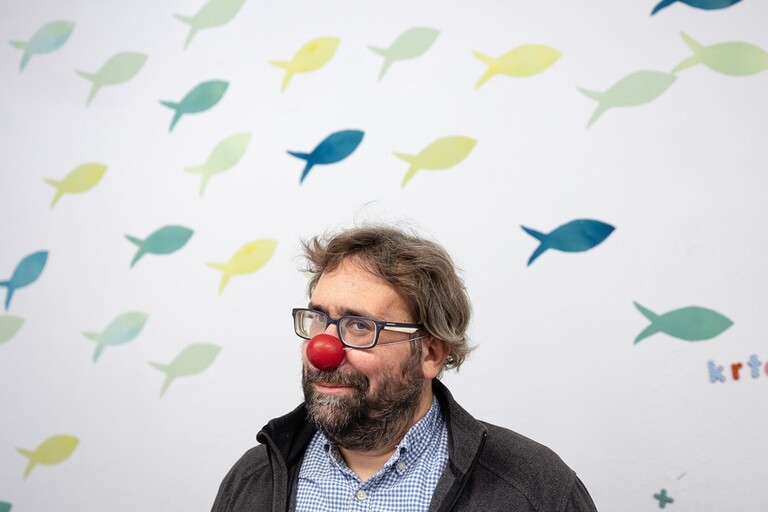Minister and healthcare clown
A charity that has been helping patients through the treatment process since 2001...
A charity that has been helping patients through the treatment process since 2001. Its specially trained members strive to change the atmosphere in medical facilities and relieve stress not only for young patients, but also for their parents and relatives, as well as improving the autumn of life for the elderly. There are currently 93 professional clowns in the country who regularly visit 63 hospitals, ten homes for the elderly, and one hospice.
David Najbrt was born in Prague and graduated from the Protestant Theological Faculty of the Charles University. He started working as a minister in 2006 in Kostelec nad Orlicí. After eleven years, he moved to Břeclav, and he has been in Lanškroun since September 2021. He has been helping the Healthcare Clown organisation for 15 years now. In his free time, he plays the guitar and is a member of the „Divadlo ve středu“ theatre association. He and his wife are raising three children.
It is not unusual for a minister to go to medical facilities to comfort the seriously ill. But it’s different with David Najbrt. He does put on a doctor’s coat before he goes to see the patients, but he also puts on a red nose – and changes into a medical clown.
„As a healthcare clown, of course I encounter challenging moments, but in a completely different role. And I can immediately see the results, which is not really the case with my work as a minister. So, in fact, I often go to hospitals to gain some strength. I don’t have to talk much, whereas as a minister, I talk almost all the time, and when I don’t, I have to do a lot of listening.“
Healthcare clowns are not required to be hilarious, throwing around jokes all the time.
„Actually, it’s best not to talk much. Verbal humour doesn’t work that well in our job; we usually try to show an awkward situation where we mess something up on purpose,“ says David. That is why clowns usually come in pairs. The humour is created between the two of them and there is not that much pressure to interact with the audience, which is usually, apart from the sick children, their parents. The parents are often much more stressed than the kids. But when they see that their kids have been able to relax and feel happy thanks to the clown, they relax, too.
For the clowns, establishing a generally relaxed mood starts already when they get in contact with the staff of the given healthcare facility. The arrival of the clowns is announced in advance. In spite of this, it has happened in the past that the parents or the patients thought the clown was a doctor, which is because they don’t look like clowns from a circus. No painted face, no motley-coloured clothes. Apart from the white coat, they wear a stethoscope, they carry a clipboard – but they wear their identifier: the red plastic nose.
Sometimes, however, this still doesn’t help. „Either they don’t notice the clown nose at all, or they think it’s a real doctor who prefers a relaxed approach to patients. A few years ago, this was quite common,“ laughs David Najbrt. However, the fact that the one who has arrived is not really a doctor is revealed within a matter of seconds.
However, there are moments when the clowns need to put aside their necessary artificial noses. „There are some psychiatric wards where the patients suffer from a clown-phobia as a result of certain horror films. Sometimes, we even need to take off our white coats because they evoke fear in some children. But these cases are really quite rare.“
NOSe Programme (for the operating theatre)
The Healthcare Clown organisation, which was founded over 20 years ago, has various programmes ready. „One of them involves visits to intensive care units. Then, there is the NOSe programme – a clown spends time with the kids before they get premedicated and also accompanies them to the operating theatre, which is a moment where parents are no longer allowed.“
David Najbrt has also found music is very useful for communicating with sick children. „As a minister, I play the guitar. In hospitals, however, we usually use the ukulele, it’s smaller and easier to carry around.“
Selecting a clown is not about the candidate performing a skit. It’s about testing how well the candidate can handle the psychological strain. Even clowns who have been doing their job for a long time sometimes experience a moment that they find hard to handle.
„That’s why we have regular supervision sessions where we share our experience from the field,“ David explains. „As soon as I change into my ‘costume’ and put on my nose, though, the stage fright is surprisingly gone.“
David has wonderful memories of his studies at the Protestant Theological Faculty. „Lots of excellent teachers and classmates; the whole environment was very open and free. Less than a third of the people were actual believers. Most of the classmates came because of the excellent teachers, some of them had never even been to church. In this sense, it was more inspiring than a seminar only with people preparing to be ministers.“
David Najbrt, however, did not hesitate when talking about his pastoral robe. What is the most difficult part of being a minister? „I don’t know if there’s anything hard about it; I find it joyful.“
Jiří Novák, photos by Michal Novotný
Editorially abridged
